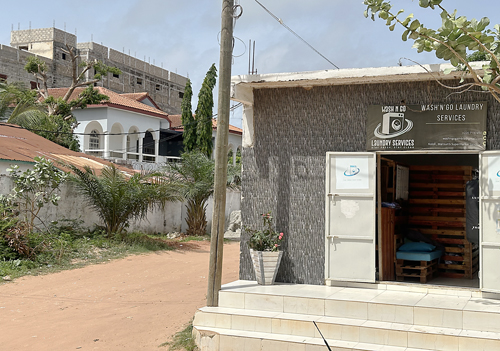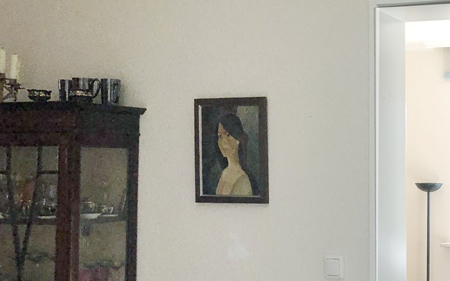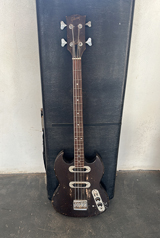
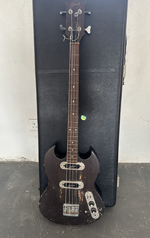
left the photo i sent on May 14th, right from today
Thursday, 31
i'm wrapping up the bass topic with the end of the month.
there was a brief discussion yesterday about not having taken a photo when the bass was picked up or returned. i immediately said i didn't understand the point—because i had no intention of going to court. that's not what this is about at all. it's about something else entirely: how people show up. how they deal with each other. what kind of care or consideration they bring.
now i'm left with a bass missing a bridge nut—a part i discovered yesterday is being sold on eBay for €100. so yes, removing it accidentally could make sense.
still, i know i didn't do anything wrong, even though i was blamed. i was told that if i hadn't lent the bass in the first place, none of this would have happened. but i pushed back—loudly, clearly. i wasn't the one who changed the strings. i wasn't the one who removed the bridge nut. i didn't commit the act. at most, i could have prevented it by not giving out the bass. that's not the same thing.
they also accused me of changing my mind only after returning from Europe—that before leaving, i'd said i didn't want much, and then later started thinking about the value. that may be true. i did learn that this was a vintage Gibson, that it meant more than just an old instrument lying around. But that doesn't make me dishonest. people are allowed to reconsider. that's part of taking responsibility, not avoiding it.
i think they may have been proud of offering that big, carved, local mask—and i didn't like it. i feel sorry for that. but on the other hand, there was no space to imabine anything else. no room for another trade, for a different kind of exchange. once the mask was on the table, that was the end of the conversation. either i take it, or i don't.
so here i am, with a changed bass, a missed cable (i said that i want it back), an amplifier that i've let go for good, and the story of something well-meant turning sour.
i wish it had gone differently. but i also stand by how i moved through it. i don't regret offering the bass. i believe in sharing, in generosity. But when something gets lost or damaged, it needs to be acknowledged. that's not about money—it's about care, and about responsibility.
sometimes care isn't reciprocated. that hurts. but it doesn't mean you stop caring.
Tuesday, 29
yesterday, when mister t brought the bass, i noticed that the strings were sitting oddly. the moment i was about to say something, i thought it was pointless. i mumbled something and let it go.
today in the studio, after doing some gardening and already feeling exhausted, i thought that—at least to get something done—i would adjust the strings. but it turned out that it wasn't that easy. the bridge at the top of the bass guitar's neck was shifted, and a small but essential part—a bridge nut—was missing.
i called mister t and asked if he still had it, but he didn't know anything about it, since he hadn't changed the strings himself. i asked him to look into it. i wonder what had happened.
of course, the missing part bothers me—but not mainly because of its price or that the value of the bass has diminished. not at all. it's not about money. it's about the care we put into things.
i didn't lend the bass thinking about ownership or return. i offered it because someone wanted to play, and that felt worth supporting.
but when something goes wrong, when something gets lost, it matters to acknowledge it—to try to make it right. to tell it the person who owns it. that's what i'd like to see: not people watching out only for themselves, but people correcting with each other—carefully, respectfully. that's the music i believe in.
which brings me to a conversation i had some days ago. i met a woman who's lived in gambia for 30 years. she runs a yoga studio—that's how we met. she asked about my project, the art center, and whether i had plans to make money from it.
her question surprised me—not because it was strange, but because it revealed a difference in where we begin. i could not have more clearly defined my point: it's not about making money.
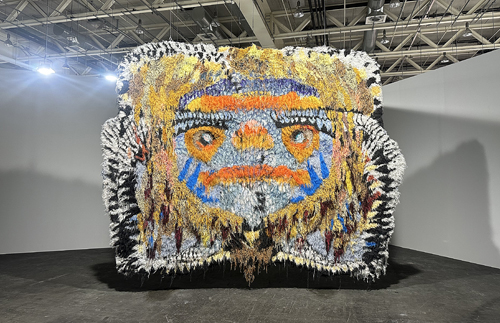
20250619 (artwork at Unlimited art basel)
Caroline Achaintre Gobbler, 2015, Hand-tufted wool, 342 x 440 x 10 cm
Monday, 28
Mister T came by today. He parked his massive car backward to the gate, as if he could quickly drive away again. He opened the back door to reveal a large (approx. 150 cm high), intricately carved wooden mask.
This story, however, begins back in May when Mister T posted on Facebook that he was looking for an electric bass guitar. He had never played before, but wanted to try. by all means. i reacted spontaneously and offered him mine. i'd had this old bass for almost 40 years, but it had been sitting idle since long. Loaning it out felt benevolent. i liked the idea of the bass played again.
Shortly before i left for Europe, Mister T told me he wanted to own the bass. He said he didn't like borrowing things. i told him we'd talk about it when i got back – maybe we could trade. i didn't think much of it. i was in travel mode, confident and distracted, and flattered that someone wanted something from me.
Then, when i was in Switzerland, i was told "This bass is worth something" what got me thinking. This wasn't just an old instrument gathering dust—it was a vintage Gibson, the kind musicians seek out. Suddenly, i wasn't so sure whether i should give it away.
The Mask
Back in the Gambia, Mister T sent me a photo of a carved mask he proposed as a trade. But i immediately realised i didn't like it — clearly male, with a mustache, heavy-lidded eyes with bags underneath them, and a mouth open wide in a way that felt forced. i had dreamt of something else. The carving featured elephant tusks — perhaps a symbol of strength, memory, wisdom. But even that didn't soften the face for me. It felt rigid, too theatrical. i couldn't connect with it.
Today, seeing the mask in person confirmed everything i'd felt. It was large and skillfully made, yes. The elephant motifs were striking. Nevertheless, there was a kind of strange presence i didn't want in the house. i couldn't imagine living with it.
Mister T looked exhausted. There had been a storm last night — one that passed us too — and a tree had fallen on his solar setup. He spoke of it plainly, as if trouble was just part of the weather. He brought the bass back though, he had cleaned it, put on new strings.
We chatted. i felt a bit bad, and he confirmed my feeling by saying that i had proposed the trade. i was sorry. He would pay me 10,000 Dalasi, he suggested. From what i found online, it wasn't really enough. i wasn't able to give the bass away like that.
He hadn't brought the amp and cable i had given him together with the bass, and i didn't ask for (actually i only thought about after). Anyway, i was glad to be rid of the amp, as it wasn't working properly anymore—somehow the current was transferring to the guitar, and no one had the patience to look at it. So it rotted away in the store. i could have used the cable, because now i'm planning to take the bass with me to Kololi next time. Luckily, i have a spare.
Later, i picked up the bass, gave it a quick look. Clean, restrung, slightly more dignified than when it left. i placed it back where it had been and forgot all about the trade.
Saturday, 26
today we ate at Solomon's. i love the dishes baked "in foil"— rich in flavour and comfort. while waiting for the food, i went for a swim in the sea. the tide was at its lowest and to reach the water i had to walk across the mudflats.
it was afternoon, around 4 pm. the sun was shining warmly, and the beach was lively with families and children playing. their voices and splashing echoed all around. the sea, in contrast, was calm. i swam out with ease.
when the saltwater reached my lips—something so familiar, yet oddly distant—i realised i had almost forgotten that taste.
as my gaze wandered over the sea to the horizon and i saw nothing but the sea, for a brief moment, i felt a deep sense of peace and freedom—blissful and light. a kind of quiet joy. it came with a wave of optimism, a soft assurance that there is beauty ahead.
Friday, 25
(addendum)
sometimes i think i have cancer. sometimes i'm really scared of it—of suddenly becoming seriously ill, of having to rely on help. nothing would ever be the same again. a goodbye to life i'm not ready for.
today i thought differently. my life seemed so hopeless that i thought: why not cancer? at least then i'd have something to focus on. a direction.
Thursday,
24
i tell my voice not to fall silent again. looking for inspiration that doesn't come easily.
the humid climate makes restless and tired at the same time.
i could waste hours watching nonsense on social media—reels especially. they hook you and lead nowhere and leave behind a void. in the end, they make me unsteady and grumpy, because i know i've wasted precious time and gain nothing out of watching other people's bullshit.
writing a text, on the other hand, gives me a sense of satisfaction. to varying degrees. some pieces release more tension, some less, others are rather shallow.
for sure the readers notice.
however, i've known this for a long time—after all, i've been keeping this diary/blog for almost twenty years. actually crazy, somehow.
for sure, you can live with a certain craziness.
there were times i thought people were commenting on my diary (though they didn't).
i heard their voices and related them to my text. it was that what they said somehow fit with what i had written—i longed for feedback or the feeling of exclusion generated this.
you go through processes: bursts of clarity, long plateaus of doubt, small breakthroughs, and days when everything feels meaningless. there's the inner resistance, the hesitation to be exposed, the fear that no one really sees you.
and then there are the darker corners: paranoid fears, imagined criticism, the harsh voices of others in your head: maybe they find me too simple. or dull. or, worst of all, arrogant—especially here in Gambia, where there's so much frustration about the state of the country, and where my presence might seem misplaced or misunderstood.
and yet you keep going. because you have to. you have to overcome the scary parts—the emotional silence, the self-doubt, the temptation to vanish—because if you don't, they'll quietly kill the parts of you that still want to speak.
Wednesday, 23
yes, i bought the bike this morning.
after my appointment with Natalia, my hairdresser, i came home—and couldn't resist passing by the shop again. the bicycle was still there. i stood at a distance and looked in. she saw me, waved. i waved back.
"Come closer," she called. so i did.
she started to explain. the owner lives in Sweden, and apparently the price between the two sellers—the men from yesterday—hadn't been clearly communicated. she made it a little suspenseful before finally telling me the number: 3600.
Okay, i thought. i had expected more.
"It's fine," i said.
whenever i'm in a buying situation like this, i tend to feel flustered and awkward. i always have to force myself to bargain. even after nine years here, i still feel foreign.
and, as a matter of fact, only after i bought the bike did i start noticing the small flaws. the brake situation, for one. at first, i thought it only had a front brake, and i was already picturing myself doing an accidental somersault. so i decided to add a rear wheel break. on the way to the workshop, though, i realized—wait, there is something. i got off and checked. a few guys nearby had been watching me and asked what was wrong.
"There's only a front brake," i said. "no, no," they told me after a quick look, "it's a backpedal brake."
Ah. Okay.
and then there's a wobble in the front wheel. not dramatic. i noticed it while riding. but still, it's mine now… cool. indeed, less hot than doing everything on foot.
Tuesday, 22
i've been thinking about getting a bike for town—nothing fancy, just something to move around more easily. this afternoon, i saw one at the neighbouring secondhand store. the man there recognized me; he remembered i'd once bought a bedside lamp. he remarked i'd been away for a while. i said i had been traveling.
the bike was priced at 3500. the handlebar was loose, it was locked with no key. i said i'd need to try it out before buying. they told me they'd take it to the repair shop across the street—no problem. i said i'd be back soon, just heading to my supermarket.
when i returned, none of the young men were there—only a young woman and an older man. she told me she was in charge now. i asked if i could try the bike, and she agreed.
when i asked about the last price, she said 3200. i offered 3000, but she wouldn't budge. i told her i'd needed to go up to my apartment to get the rest of the money. i wanted to give her 2000. she said okay—but then, as i was about to leave, she started taking photos of the bike and suddenly said the price was 3300.
i reminded her she had just said 3200. she insisted by almost mocking me; forming her mouth obviously trying to twist the "two" into "three". i told her i had seen another one for 2500 elsewhere, but i still went to get the money, but hadn't given her any prepayment.
when i came back, she told me she had spoken to the men on the phone, and they now wanted more than 3500. i said that wasn't okay—the price had already been agreed. she told me i should go to the other shop, then.
i followed her suggestion almost automatically and i left, disappointed but still trying to be reasonable. it began to rain. i was walking around in the middle of all this over a used bike, and i thought—why am i even bothering? and turned back towards home.
when i passed her again, i said: You sent me out into the rain. You're my neighbours, but i don't think I'll buy here again. I'll tell everyone that you raised a price that was already agreed. she shouted: Get the fuck out of here.
it had turned into a fight. i left—angry with a kind of sadness that lingered longer than it should have. i found myself turning the situation over in my head—not just what happened, but the weight it carried. there's something exhausting about trying to hold people to their word and being met with hostility. it's not the money that hurt, or the bike i didn't get—it's the feeling of being treated like a fool for expecting decency.
maybe this is just what happens sometimes when expectations meet power imbalances, or when fairness is treated as naivety. probably it's not personal—still it lands that way.
Sunday, 20
The Outcry and the Echo
it's like an outcry.
that's what comes to mind when i think of the many oversized artworks—at Unlimited this year, but also at countless exhibitions in the past. monumental gestures. temporary takeovers. a kind of visual scream.
i understand this language. i've spoken it too. my own work University of the Gambia measures 3.15m by 2.1 meters when hung. it holds a presence in the room—through size. and then—it is packed back into a manageable format. folded, stored. silenced.
there is something deeply vulnerable in this cycle. the artists arrive, make their gesture, speak—loudly, perhaps beautifully, even urgently—and then disappear. it's a dilemma i feel, and see around me. the outcry is brief. the echo, if there is one, is rarely guaranteed.
some artists try to escape this ephemerality. they leave permanent traces: interventions, public sculptures, architecture-integrated works. i think of Olu Oguibe's obelisk at the last documenta—I am a stranger and you welcomed me—a phrase that cuts across borders and contexts. that obelisk stood immovable, unavoidable. a statement that stayed. (However, contrary to the artist's wishes, the sculpture was moved to a less prominent location in Kassel—incomprehensible to me.)
i've known the beauty of the ephemeral through music—my other artistic life. for about twenty years, music was my primary language. i started by playing bass guitar and singing, and later, for more than a decade, i composed and mixed tracks at Malola Sound System, mostly dub tunes. i loved working with rhythm and space, echo and delay, layering sound in ways that dissolved just as they built up. music is ephemeral by nature. you perceive it only in the moment of hearing. it leaves no object behind—just a trace in the body, in memory, in emotion.
perhaps my art is moving in the same direction. toward time and gesture.
i don't put myself under pressure — not in that heavy way almost beating myself to work. ideas mostly generate themselves. i am here for another outcry, sooner or later.
Saturday, 19
something has changed. i feel like a different person—or maybe it's just the weather pressing down. after three weeks back in gambia, i've withdrawn to my apartment in Kololi for a little time out. me and our three-month-old puppy, both of us flopped out on the floor like forgotten laundry.
my last stay seems like a distant chapter, though it was just two months ago. a trip to Europe loomed ahead, and i was constantly in motion—packing, planning, ticking boxes. now i'm only available for the bare essentials. no rush. no polish. no obligations i don't choose.
everything had to be spotless—styled, managed, under control. now, i drift. no makeup, no fashion sense, hardly any clothes at all. i've dropped the idea of appearances.
i know how i'm seen: the Toubab. one of those white women who've stuck around long enough to lose the sparkle. no longer a mystery, no longer someone to project dreams onto. just another foreigner who knows too well how things work here.
and yet, i'm grateful not to be taken for a tourist. in a shop, a woman asked if i spoke Wolof, Mandinka, or any local tongue. that felt oddly comforting, almost like belonging.
(i have to admit i am not able to learn them, even i tried)
thought, reflection, dialogue. but do they count? contemplation and understanding creativity offer hope if there's a space where thought leads to action.
i keep circling back to this persistent feeling that i have to justify myself. not just explain what i've done, but account for why i haven't done more. why i haven't produced something brilliant. why i haven't been visibly successful.
actually, i didn't want to bring my mother into this again—but when i'm in hamburg, she always asks What have you been doing? Have you been successful? i believe she means well, maybe something closer to "Did you have a good day?" but if i hadn't time—or the desire—to visit, i owe her a reason.
that innocent question—"What have you been doing?"—has begun to gnaw at me. it's amazing how much weight it can carry. and then there is an obviously easy answer: I haven't done much, but I am fully fine with it. even my mom would be ok with that answer.
Friday, 18
I write entirely to find out what I'm thinking, what I'm looking at, what I see and what it means.
Joan Didion, "Why I Write," The New York Times Magazine, December 5, 1976
The unexamined life is not worth living.
Socrates, as quoted in Plato's Apology 38a, c. 399 BCE
All About Me
i don't write to feel less alone. that's not what triggers it. writing, for me, is a way to clarify thoughts—to unravel the knots in my head. still, the idea of someone eventually reading what i write matters. if i were to write in a private notebook that no one ever saw, i'd lose interest.
in my youth, i kept handwritten diaries. at the time, i imagined they might be discovered after my death—read like a hidden treasure map of who i was. (as i still do with this one here :) but in reality, i often shared them.
looking back now, i think something in me began to derail quite early—around the age of twelve, after my first erotic experience, until my early twenties. those years were a mix of intensity and misalignment.
at home, my admiration for a teacher wasn't understood—it was questioned. i treated my best friend rather cruelly. she was devoted to me, almost dependent, and it irritated me. meanwhile, i was drawn to stronger personalities—more confident types from wealthier backgrounds—people who challenged me.
that's how i ended up sailing. it gave me a sense of freedom and excitement that riding never did, though i had read countless horse books. i never really integrated into the riding stable scene. sailing felt more alive.
those years were full of movement. i was always on the go, filled with a kind of restless drive. this pulled me away from my family. i found traveling with them dull and uninspiring. i couldn't share my excitement for life with my parents. my siblings were too young to connect with.
so i turned inward. i tried to cope in private ways—disordered eating being one of them. it yanked me out of that terrible emptiness i now understand as burnout. but it came with guilt, always. why i kept falling into it, i still don't know. perhaps it was my secret companion, something to hold on to when i had no one else to talk to.
(in a way, this diary serves a similar purpose. the difference is that it's not destructive like bulimia or binge drinking. it's better and healthier. writing doesne't hurt my body. it gives space)
life felt heavy. school was overwhelming. and at home, no one really grasped what i was going through.
true moments of relaxation only came much later in life—during things like autogenic training or yoga, for instance.
also, whenever i started something new, i noticed a shift. i became more balanced when my focus was clear and purposeful. for example, when i moved to basel, and later to gambia, i experienced a strong, positive sense of calm—a grounded feeling of inner balance.
now after nine years in gambia, that initial clarity has started to fade. the question of meaning has become more fundamental, and strangely, it doesn't ground me—it distracts me. i start to question the value of my efforts: what is all this for? there is a pressure i put on myself, a need to justify the life i've built here.
i write now not to escape but to remember, to make sense. and yes, a part of me still hopes to be read.
Thursday, 17
The following is from a note i wrote on 13th of June and which i edited today.
now on the train to Basel, i think back to my stay in Hamburg—to my mom.
i think she made an artist out of me by questioning my talent. as my father denied the revolutionary inside me.
he often stated that my leftist opinions came from my teacher (the first three years of high school, 6 to 9). he never once realised—or understood—that something inside me longed for the liberation that teacher spoke of. or even for the time of the sixites and seventies.
i overcame the sadness they both planted in me, by not really seeing me, not really hearing me. maybe that sadness made me stronger. it taught me to protect the soft, essential part of myself— to let my artistic feelings survive, despite their resistance.
over the years i gave them so many of my paintings—to impress them with my work. they always thanked me, politely. and they framed them properly, hung them on their walls for decades. but then, they threw them all away. somehow secretly—not to offend me.
did they ever truly like them?
what's left: a self-portrait in blond, and a portrait of a woman with dark hair.
i remember when i painted the latter—at school, in Kunst Leistungskurs, the wednesday afternoon class, the free style lesson, when we were allowed to follow our self defined work.
i had started with the background, and my art teacher asked me why i did so. i thought about it but had no answer. the portrait was clearly fictional. a person i didn't know. my boyfriend at the time cheated a lot. she could be one of his lovers.
as usual, my parents framed those two paintings. they're hanging in the apartment my mom is living in— the fictional one next to the spare room, which serves as an office and changing room. you see it immediately when you enter the flat. the self-portrait is opposite. you will see it when you follow the gaze of the fictional woman.
my father took many photos of me. photography was his passion. once, i asked him to do so. i remember it well. i was in need of beautiful pictures of myself, so i advised him to make them lovely.
however, most of the time, i didn't really appreciate being snapped. and then seeing myself in one of his collages, where he put me in a light i didn't belong to. by then i had already moved out of home. they lived with my siblings in a newly acquired villa.
i came to hate it—because it wasn't me in those images. it was someone they wanted me to be.
however, we never talked about identity. still now, my mother says things like this: "You don't like this. It's not your style." without even asking what i think. my image, my art, my self was constantly interpreted for me, never with me.
Tuesday, 15
life is work
at the end of the 1980s, i made a music piece that included the sentence "life is work." my father used to say this phrase with a certain emphasis: You have no other option than to work. but sometimes, i also heard a resignation about his own life.
the sentence made it into an image that was part of MALOLA's project Strandparties für Nihilisten, which later became the exhibition strand at Westwerk in Hamburg in 1990.
based on the physical formula w = f × d work equals force times distance, which means every movement is work—a very minimal view of the concept of work.
as students, we used to say, "I have to work now," which meant studying or devoting ourselves to something creative. what we really meant was: "I need time for myself to contemplate and do my things."
then came the phase of working to earn money: "I'm going to work now," which meant getting a job of some kind. you went somewhere, did something for others and got paid.
later, in adulthood, work became more integrated into everyday life. it could be freelance, like artistic practice, or regular employment to make a living. housework was something we always had to do, but strangely, it wasn't considered "real" work. and yet—it is work. unpaid, often unnoticed, but essential.
i'm lying on my bed drafting this text—does that count as work? lying down doesn't look like work. sleeping isn't work. being invited to dinner doesn't require work from the guest. and when i am ill—when my body forces me to stop, to withdraw—am i not working then too? recovery takes energy though. pain demands attention. there is a quiet, invisible labour in healing.
if work can be done with ease leads me to the phrase hard work, which is held up as a high virtue. you push yourself to your limits and are completely exhausted by the evening and everyone admires how hard you've worked.
still, there's this side of work: resistance to overcome one's weaker self. that dragging feeling, where everything else suddenly seems more important— checking the phone, adjusting a corner of the room, making coffee, continuing to read the book i enjoy so much but which doesn't really mean work (in my eyes). sometimes it is like running away from work, even though no one is chasing me. not at all, it is just the task that is waiting. nothing dramatic. so what is that threshold i hesitate to cross? fear, depression, perfectionism, the vulnerability of doing something that matters? for sure, if i could answer the question, i would work more.
maybe effort isn't the only thing that gives work its value. perhaps there's a kind of work that doesn't leave you exhausted, but expanded, fulfilled and satisfied. maybe it's about allowing yourself to do something without anyone else than you encouraging yourself to open up to your task.
in the end, perhaps work isn't just what we do—but how we relate to it. it can be duty. it can be burden. but it can also be expression, connection, or even a form of care. perhaps the deeper question is what kind of work brings us alive—despite the resistance, or perhaps because of it.
(P.S. A little information about the internet speed here in Tujereng: 0-250 kbps, seldom and for a short time up to 1.2 mbps)
Wednesday, 9
Pas de Deux my attempt to write a play. hope you enjoy it. similarities to people i know were an inspiration to me, but the play is fiction.
Tuesday, 8
yesterday, i happened to see a friend's WhatsApp status—she looked radiant and happy. coincidentally i had thought of her in the morning and sent her a message. i was pleased that she seemed to be doing well. in contrast, i added, i wasn't doing so well at the moment—i was having trouble adjusting to rural life in Africa.
she responded by voice message, saying that her life wasn't as easy as it seemed. on the contrary, it was demanding and full of challenges... a phone call wouldn't be possible until the end of september at the earliest. but, since she had already been to Gambia herself, she could understand that it was always a culture shock.
in a follow-up message, she explained that what i had seen on status respective instagram was just "advertising", which reminded me of the Facebook Gambian Women's Business Club's meeting in Bakau years ago. one of the leaders had told us clearly: NEVER POST ANYTHING NEGATIVE. in case you're feeling down, don't let it show—it's bad for businesses.
certainly i do understand the logic behind it though i know how important it is for me to have a space where i don't have to pretend, where i don't have to polish the surface to make my content enjoyable for everybody. no, for me, it's not about getting lots of likes, but about understanding.
being back evokes mixed feelings. i'm in a familiar, almost too familiar place. however, meanwhile i am aware that processes move slowly though what i once valued annoys me now. communication often hovers in the unknown. it feels isolating to invest energy and recieve silence in return.
there is also beauty and moments of connection. nevertheless, the emotional labor stays hidden behind calm faces and polite greetings most of the time. sometimes you can detect a small countenance, a twitch, or a lost tear, but certainly not a verbal statement, as that could lead to confusion or into murky waters. it's safer to rely on commonplace phrases.
being honest—especially when things aren't going so well—is both an act of courage and a risk, because you're more likely to receive snubbing reactions than compassion, which in turn reinforces the feeling of being left alone again and is therefore counterproductive. for me, writing is, in a sense, a silent form of resistance against a culture of dissembling (not tied to a geographical region; it can take place anywhere in the world). of course, the thought that someone is reading my writing helps me feel less alone in this strange dance between effort and dedication.
Sunday, 6
for weeks now, not a single sentence has come out of me.
only this one: Nothing comes out of me. maybe that, too, is a beginning.
i've returned from europe, where life moved with a quiet precision. technology didn't shout—it simply worked. trains arrived on time. trams glided through cities like second nature. even with a modest budget, i could access almost anything i needed. there was comfort in that rhythm, in the ease of things working as they should.
now back in the gambia already for a week, and my mind still feels heavy, like it hasn't caught up with the body. there's a dullness i can't shake. a quiet frustration. the contrast is sharp: here, things move slower, with more resistance. the systems are not as seamless. you feel every step of the process.
on friday, i spoke to a friend who said something that stuck:
We Europeans are spoiled.
she's chosen not to live in Gambia, and i understand— there's a kind of ease she's unwilling to give up.
however, this is still home—even if it feels unfamiliar right now.
perhaps i'm still in transit, not between places, but between states of mind. the real return takes longer than a flight. i trust that with time, i'll find my rhythm again. i'll rediscover the quiet joys that don't rely on speed or efficiency. i'm sure of it.
Tuesday, 1
Art Space Work of the Month
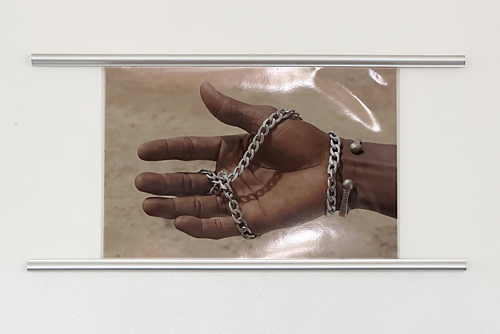
Maren Sanneh (1958), Hand in Chain (3)
photography, inkjet on glossy paper, 2017, 29,7 x 42 cm
